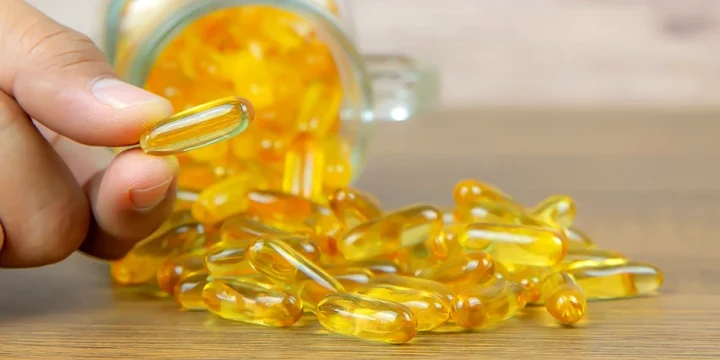As an experienced medical doctor with patients deeply invested in bodybuilding, I've consistently observed the impactful benefits of fish oil supplements in their fitness journey.
Recognizing its significant role, I've decided to share my insights through this article. Here, I'll unveil 10 key benefits of fish oil that not only enhance muscle growth and recovery but also contribute to overall health, making it a valuable addition to any bodybuilder's regimen.
This piece is a blend of my professional observations and the latest scientific research, aimed at enhancing the bodybuilding journey of my readers.
Quick Summary
- The benefits of fish oil for bodybuilding include delaying the onset of muscle soreness, improving the quality of workouts, helping muscle protein synthesis, and improving endurance.
- Fish oil also gets rid of excessive liver fat, supports insulin function, and reduces depression and anxiety symptoms.
- A study published by the Journal of the International Society of Sports Nutrition asserts that DHA and EPA supplements might help reduce muscle cell damage after exercise and aid muscle protein synthesis.
- Based on my experience, incorporating high-quality fish oil supplements can be a game-changer for those seeking improved physical performance and health.
What Are The Benefits of Fish Oil For Bodybuilding

The benefits of fish oil for bodybuilding include delaying the onset of muscle soreness, improving the quality of workouts, helping muscle protein synthesis, and improving endurance.
Fish oil, rich in omega-3 fatty acids like EPA and DHA, is known to reduce inflammation and improve hypertriglyceridemia.
In my medical practice, I've observed its widespread use as a supplement due to these benefits.
Notably, the omega-3s in fish oil are often more beneficial than those found in plant sources.
See our list of the best fish oil supplements for bodybuilders here.
Some of the fish oil benefits for bodybuilding include:
1. Delays Onset Muscle Soreness

Bodybuilders often experience DOMS due to intense workouts. In my medical practice, I've found that fish oil, supported by a 2017 Journal of Dietary Supplements study, effectively reduces muscle soreness [1].
Furthermore, a 2017 study from the Journal of the International Society of Sports Nutrition shows that DHA and EPA supplements can lessen muscle cell damage and enhance protein synthesis post-exercise, which aligns with the improvements observed in my patients [2].
2. Improves Quality Of Workouts
EPA and DHA fatty acids in fish oil can enhance athletic performance, as I've seen in my medical practice where patients report improved strength and endurance after incorporating these omega-3s into their diets.
Their anti-inflammatory properties are particularly beneficial post-workout, helping maintain strength, flexibility, and range of motion.
One 2018 study published by the Journal of the American College of Nutrition proved that the supplementation of EPA and DHA omega-3 fatty acids commonly found in fish oil has a positive effect on muscle performance and recovery [3].
It is highly likely that fish oil also hastens muscle growth, preserves muscle mass, and improves body composition.
3. Helps Muscle Protein Synthesis

Omega-3 fatty acids, particularly from fish oil, play a crucial role in muscle growth and recovery by supporting protein synthesis and influencing hormonal balance, including testosterone and cortisol levels.
In my experience as a medical doctor, patients who include long-chain omega-3 polyunsaturated fatty acids in their diet often see a slower loss of muscle mass, thanks to the anti-inflammatory properties of fish oil, which also enhance muscle protein synthesis sensitivity to insulin and amino acids.
This is particularly beneficial for individuals aiming for better body composition and those seeking to maintain lean muscle.
4. Improves Endurance

Omega-3s decrease heart rate and the amount of oxygen your body burns through every minute, which means that your body will need less energy to run that marathon you’ve been anticipating.
Take the best fish oil and achieve your muscle-building goals. Including it in the daily diet may also help with weight loss.
5. Improves Reaction Time
Reaction time dramatically improved in soccer players who used fish oil supplementation for just four weeks.
This improvement could also be attributed to omega-3's benefits for mental health and focus, crucial for athletes' training and performance.
6. Helps In Maintaining Muscle
What is especially important for soccer players and other bodybuilders is to boost muscle strength which is possible to have if you take fish oil pills or any other fish oil supplement.
Moreover, fish oil's potential in maintaining skin health can be an added advantage for bodybuilders concerned about their physical appearance.
7. Burns Fat Faster

Fish oil can accelerate fat loss while increasing lean muscle mass.
In my medical practice, I've observed patients who supplement with fish oil daily often experience a significant reduction in body fat and an increase in lean muscle within six weeks.
Omega-3 fatty acids act as a catalyst for fat burning, leading to noticeable body composition changes in as little as eight weeks.
8. Promotes Faster Recovery
9. Boosts Better Physical Performance

10. Other Health Benefits
Here are other health benefits of fish oil.
- Lowers blood triglycerides
- Supports insulin function
- Reduces risks of colon, prostate, and breast cancer
- Gets rid of excess liver fat
- Reduces symptoms of anxiety and depression
- ADHD - fish oil benefits children with ADHD
- Improves fetal development
"Foods rich in omega-3 fatty acids can stop arrhythmia before it triggers sudden death from heart attacks. That makes fish such as salmon as potentially potent as any high-tech heart drug and considerably cheaper to stock up on."
- Alexander Leaf, M.D. (deceased), Professor Emeritus, Harvard University
Additionally, their role in improving sleep quality can further aid in muscle recovery and overall health.
Fish Oil Supplements As A Better Source of Omega-3s

Be Careful

Make sure you are getting EPA and DHA directly.
However, be aware of potential mild side effects of fish oil use, such as unpleasant taste, bad breath, heartburn, nausea, gastrointestinal discomfort, diarrhea, strong-smelling sweat, or headaches, as reported by Medical News Today [5].
References:
- https://www.tandfonline.com/doi/abs/10.1080/19390211.2016.1205701
- https://www.tandfonline.com/doi/full/10.1186/s12970-017-0176-9
- https://www.tandfonline.com/doi/full/10.1080/07315724.2018.1470042
- https://ods.od.nih.gov/factsheets/Omega3FattyAcids-HealthProfessional/
- https://www.medicalnewstoday.com/articles/326206
About The Author
You May Also Like






